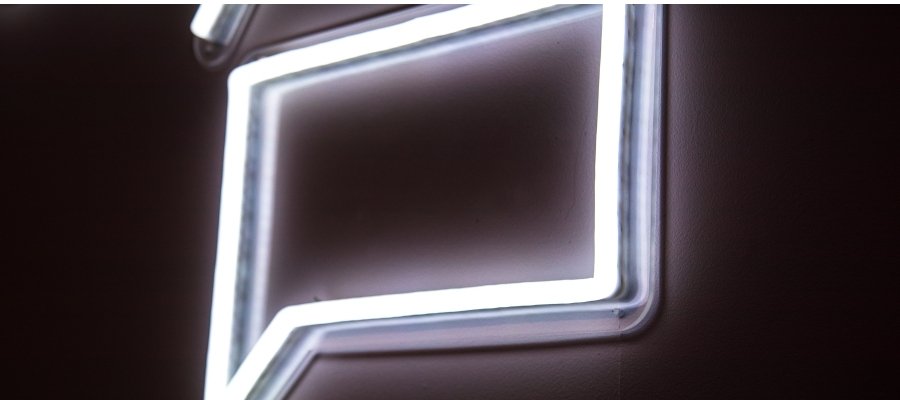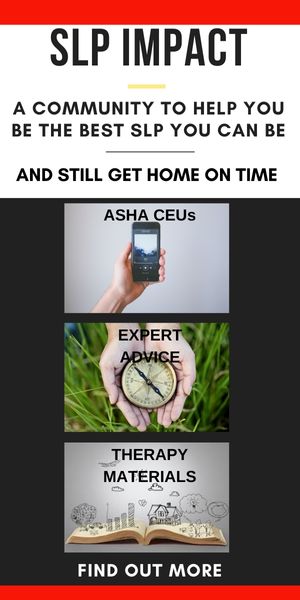Good or Bad?
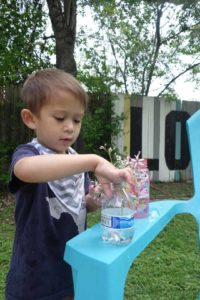
Exhibit A.
I spent most of my day in the backyard. The kids played, and I shuffled between my motherly duties of laundering/cleaning/sitting idly. At one point, the three-year-old thoughtfully placed blooms into a container. Language used to describe him could be: sweet, gentle or creative. Check out Exhibit A.
Now, let’s juxtapose this with his actions from a few days prior. My husband and I decided to take our three offspring to see an art exhibit. I whole-heartedly acknowledge that this was mediocre, adventurous parenting. While trying to get a family photo, said three-year-old purposely kicked his sister in the face, and my maternal ears heard a joyous chortle emitting from his vocal cords. Now, language could be used to describe him as mean, physical or malicious. Check out Exhibit B.
So, is my preschooler a good kid or a bad kid? Most people would say that this question is not fair. As with most things related to humans, his behavior exists in the land of the gray.
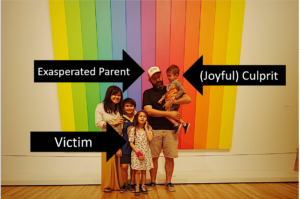
Exhibit B.
Words are Binary
Now, you ask, “What does this have to do with speech-language pathology?” Recently, through a series of events, I’ve been thinking about the power of words, and I will be the first to say that #wordsmatter. And, of course, our entire profession is based on words and language. We use words verbally, gesturally and through AT/AAC to 1) convey what we want, 2) reject what we don’t want, 3) seek information and 4) socialize. We have rules for our words, and we expect those who come to our speech-language sessions to learn how to use them to convey language. So, language is used to identify, describe, categorize, answer, ask, greet, converse, argue, negotiate, persuade and narrate. We have surely given power to our words, and this SLP honors all of this.
Now, here’s comes the conjunction. We have given power to words, and I have come to realize that our language has also failed us. Words, potentially, create binary thinking.
Black and White Thinking
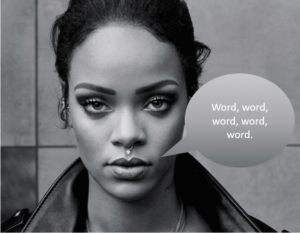
From our SLP world, the crux of our field is based on which category our students and clients fall into: typical or disordered. These two words quickly group the individuals after an assessment, and we kick into full SLP-gear when the person falls into the latter category. By default, dear SLPs, our field divides people into two groups—those who need speech-language therapy and those who do not. Some may argue that one group is better off than the other, and I’m here to say that it’s not accurate. Additional word groupings include: fluent vs. stuttering, normal vs. atypical, monolingual vs. English Language Learner.
More Than Words
The brain research will tell us that we naturally group people and things and events into categories for human preservation. This is true. Language followed suit, and our words now guide our thinking. This binary thinking, however, is beginning to take its toll. For example, I am currently working alongside a 12-year-old who loves basketball and her family. She is also a person who stutters. An assessment identified her as a student with a speech impairment, and she is currently receiving interventions to work on her fluency and the feelings associated with her communication. Here’s the thing. A formal evaluation told her family that she is “disordered,” and I understand that is what needed to take place in order to get her the interventions. In saying that, this one word did not encompass all of the qualities that this young scholar possesses to contribute to her community. One word described her, and I am confident SLPs (already) know this word does not define her.
Adding Color to our Wor(l)ds
So, I am sitting here using my language to convey these sentiments, and that thought is not lost on me. Language is valuable. At this time, the Oxford dictionary contains 171,476 words in current use. In saying all of this, as a language expert, I honor that the system is not comprehensive. Truth be told, humans are surely complex, and language will never catch up to our complicated ways. Luckily, approximately 1,000 words are added each year to convey new research and updated thinking. This is a good thing.
Here’s to acknowledging the scope of language and to exercising all of our human qualities to understand and honor one another.

